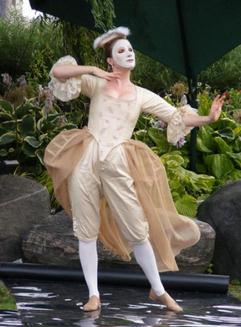Aside from religious orders and the Amazons, communities composed solely of women haven’t made much of an impact on modern media. Such females are generally cast as either rabid warriors or pious servants, leading a life of rigid abstinence that is based more on austere sacrifice than the philosophy of feminism. But surely a group of well-heeled ladies could come up with something a little more diverting than prayer or war-making, if left to their own devices.
Playwright Margaret Cavendish imagines just such a scenario in her play The Convent of Pleasure, opening this week (May 11) at Hart House Theatre. Cavendish’s convent is decidedly different than the average nunnery, as it brings together like-minded single gals in a pursuit of artistic enjoyment and indulgence. Their leader is Lady Happy, an heiress whose distaste for the male of the species has inspired her to, as she puts it, “incloister herself from the World” in private luxurious splendour.
But even as she eschews the company of men, Lady Happy has no desire to live out her days in isolated loneliness. To wit, she gathers her maiden and widowed friends about her, declaring marriage verboten and devoting their de facto order to a man-free existence. The endeavour proves a roaring success – at least at first. The women fill their hours with companionship and various entertainments, until the arrival of a handsome young heiress who unexpectedly stirs the submerged passions in Lady Happy’s heart.
This turn of events may not seem terribly surprising these days, but it must have come as quite a shock to audiences back in the 17th century, when Cavendish – also the Duchess of Newcastle – first wrote her play.
“Imagine, this was 1660, when women weren’t even supposed to be writing plays, never mind this sort of sexual awakening,” says Derek Boyes, artistic associate of the Toronto Masque Theatre. Boyes and the theatre company have adapted the little-known play as a lush Baroque production, filled with Renaissance music and dance.
Working with music director Larry Beckwith and choreographer Marie-Nathalie Lacoursière, Boyes has tinkered a little with Cavendish’s story, incorporating music by 17th-century composers William Lawes and Claudio Monteverdi.
“We’ve inserted a few masques that the women will be entertained by,” Boyes says. “There’s a madrigal that will feature dance and singing with a seven-piece orchestra, as well as a beautiful piece by Luigi Rossi.”
And while the Baroque appeal of Cavendish’s Convent is a perfect fit for the Toronto Masque Theatre, Boyes is particularly drawn to the piece’s very modern themes.
“It’s overwhelming in its beauty and spectacular majesty,” he says. “But I’m most fascinated by what is happening to Lady Happy’s sexuality, and how it challenges her thoughts about the world.
“It’s immensely interesting to see what happens to a person’s sexual awakening, when all of their other senses are already so stimulated.”
The Deets:
The Convent of Pleasure
Fri, May 11 and Sat, May 12 at 8pm
Pre-show chat at 7:15pm
Hart House Theatre
7 Hart House Circle
torontomasquetheatre.com

 Why you can trust Xtra
Why you can trust Xtra


